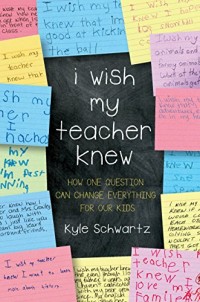2018 School Spending Survey Report
"I Wish My Teacher Knew" | Professional Shelf
A third grade teacher asked her students to complete a simple sentence. Their responses were eye-opening.
 With wide-ranging responses, children shared enlightening, and sometimes surprising, details about their personal lives and circumstances. Schwartz soon discovered that the more she knew about her students’ individual needs and concerns, the better prepared she could be to scaffold their success. When she posted a photo of a student’s note on Twitter—“I wish my teacher knew I don’t have pencils at home to do my homework”—fellow teachers responded enthusiastically, replicating the simple exercise in classrooms here and abroad. Schwartz’s tweet eventually garnered national media attention. In I Wish My Teacher Knew: How One Question Can Change Everything for Our Kids (Da Capo Press, 2016), Schwartz explores her child-centered teaching philosophy, sharing practical tips and ideas along the way. As a teacher in an elementary school in Denver, CO, Schwartz encounters concerns familiar to many educators. Noting statistics which indicate that “roughly 51 percent” of children who attend public schools experience poverty, she advises teachers to be sensitive to students’ financial situations. Instead of sending home an extensive list of school supplies, she prefers asking each family to contribute an affordable sum for the purchase of communal materials, a practice that guarantees no one is at a disadvantage when it comes time to provide items many of us take for granted. Since it’s not unusual for several students to come and go throughout the school year, often with little advance warning, she recommends being prepared with “Welcome Kits.” Contents will vary according to the needs of the school, but the aim is to ensure that each child’s arrival and departure is recognized, with proper supports in place to provide continuity. Addressing the common, and often hidden, problem of food insecurity, she cites the success of Breakfast in the Classroom, a program that eliminates the need for an early arrival (and the singling out of individuals) by making breakfast foods available to all children as they enter the classroom. Additional topics include connecting to families, acknowledging grief and loss, recognizing trauma, integrating character education, and scaffolding self-efficacy. “Teacher Tools,” activities for incorporating recommended practices in the classroom and larger school community, are included in each chapter. Throughout, Schwartz—now a more seasoned educator than when she first used her getting-to-know-you tool—draws upon her own classroom experiences and highlights related stories from other teachers and students. A teacher’s guide for the “I wish my teacher knew” lesson appears at the end of the book. The author proposes adapting the lesson to gauge feelings and concerns after any major change, such as the hiring of a new principal or the election of a president, a timely suggestion indeed.
With wide-ranging responses, children shared enlightening, and sometimes surprising, details about their personal lives and circumstances. Schwartz soon discovered that the more she knew about her students’ individual needs and concerns, the better prepared she could be to scaffold their success. When she posted a photo of a student’s note on Twitter—“I wish my teacher knew I don’t have pencils at home to do my homework”—fellow teachers responded enthusiastically, replicating the simple exercise in classrooms here and abroad. Schwartz’s tweet eventually garnered national media attention. In I Wish My Teacher Knew: How One Question Can Change Everything for Our Kids (Da Capo Press, 2016), Schwartz explores her child-centered teaching philosophy, sharing practical tips and ideas along the way. As a teacher in an elementary school in Denver, CO, Schwartz encounters concerns familiar to many educators. Noting statistics which indicate that “roughly 51 percent” of children who attend public schools experience poverty, she advises teachers to be sensitive to students’ financial situations. Instead of sending home an extensive list of school supplies, she prefers asking each family to contribute an affordable sum for the purchase of communal materials, a practice that guarantees no one is at a disadvantage when it comes time to provide items many of us take for granted. Since it’s not unusual for several students to come and go throughout the school year, often with little advance warning, she recommends being prepared with “Welcome Kits.” Contents will vary according to the needs of the school, but the aim is to ensure that each child’s arrival and departure is recognized, with proper supports in place to provide continuity. Addressing the common, and often hidden, problem of food insecurity, she cites the success of Breakfast in the Classroom, a program that eliminates the need for an early arrival (and the singling out of individuals) by making breakfast foods available to all children as they enter the classroom. Additional topics include connecting to families, acknowledging grief and loss, recognizing trauma, integrating character education, and scaffolding self-efficacy. “Teacher Tools,” activities for incorporating recommended practices in the classroom and larger school community, are included in each chapter. Throughout, Schwartz—now a more seasoned educator than when she first used her getting-to-know-you tool—draws upon her own classroom experiences and highlights related stories from other teachers and students. A teacher’s guide for the “I wish my teacher knew” lesson appears at the end of the book. The author proposes adapting the lesson to gauge feelings and concerns after any major change, such as the hiring of a new principal or the election of a president, a timely suggestion indeed. RELATED
RECOMMENDED
CAREERS
The job outlook in 2030: Librarians will be in demand
CAREERS
The job outlook in 2030: Librarians will be in demand
ALREADY A SUBSCRIBER? LOG IN
We are currently offering this content for free. Sign up now to activate your personal profile, where you can save articles for future viewing






Add Comment :-
Be the first reader to comment.
Comment Policy:
Comment should not be empty !!!